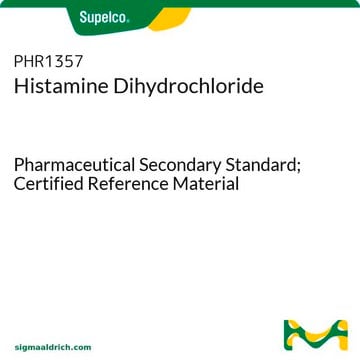53300
Histamine dihydrochloride
≥99.0% (AT), powder or crystals, endogenous histamine receptor agonist
Synonym(s):
2-(4-Imidazolyl)ethylamine dihydrochloride
About This Item
Recommended Products
product name
Histamine dihydrochloride, ≥99.0% (AT)
Assay
≥99.0% (AT)
form
powder or crystals
ign. residue
≤0.2%
loss
≤0.2% loss on drying, 20 °C (HV)
mp
244-247 °C
249-252 °C (lit.)
solubility
H2O: 0.1 g/mL, clear, colorless
anion traces
sulfate (SO42-): ≤200 ppm
cation traces
Ca: ≤10 mg/kg
Cd: ≤5 mg/kg
Co: ≤5 mg/kg
Cr: ≤5 mg/kg
Cu: ≤5 mg/kg
Fe: ≤5 mg/kg
K: ≤50 mg/kg
Mg: ≤5 mg/kg
Mn: ≤5 mg/kg
Na: ≤50 mg/kg
Ni: ≤5 mg/kg
Pb: ≤5 mg/kg
Zn: ≤5 mg/kg
SMILES string
Cl[H].Cl[H].NCCc1c[nH]cn1
InChI
1S/C5H9N3.2ClH/c6-2-1-5-3-7-4-8-5;;/h3-4H,1-2,6H2,(H,7,8);2*1H
InChI key
PPZMYIBUHIPZOS-UHFFFAOYSA-N
Gene Information
human ... HRH1(3269)
Looking for similar products? Visit Product Comparison Guide
General description
Biochem/physiol Actions
Other Notes
Signal Word
Danger
Hazard Statements
Precautionary Statements
Hazard Classifications
Eye Irrit. 2 - Resp. Sens. 1 - Skin Irrit. 2 - Skin Sens. 1 - STOT SE 3
Target Organs
Respiratory system
Storage Class Code
11 - Combustible Solids
WGK
WGK 2
Flash Point(F)
Not applicable
Flash Point(C)
Not applicable
Personal Protective Equipment
Certificates of Analysis (COA)
Search for Certificates of Analysis (COA) by entering the products Lot/Batch Number. Lot and Batch Numbers can be found on a product’s label following the words ‘Lot’ or ‘Batch’.
Already Own This Product?
Find documentation for the products that you have recently purchased in the Document Library.
Customers Also Viewed
Our team of scientists has experience in all areas of research including Life Science, Material Science, Chemical Synthesis, Chromatography, Analytical and many others.
Contact Technical Service











